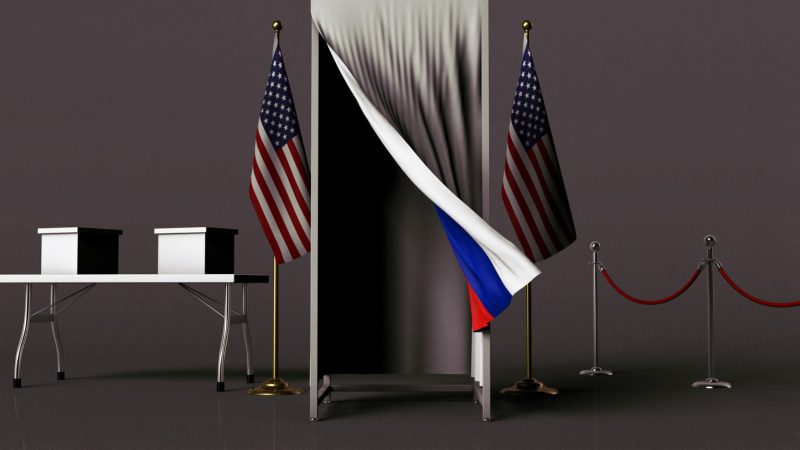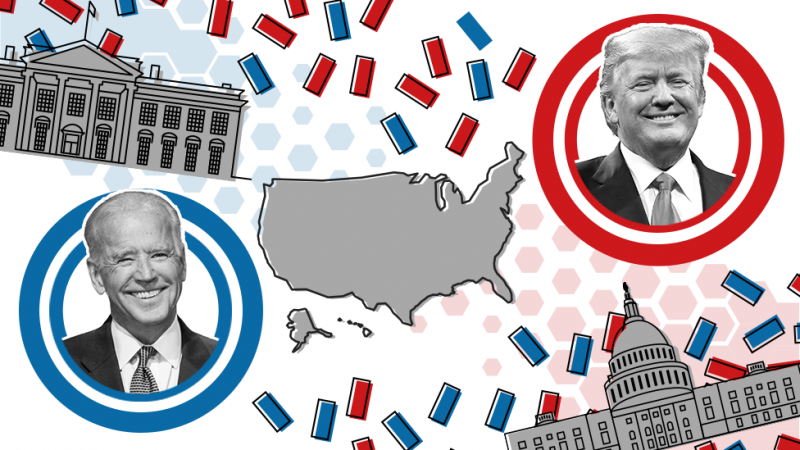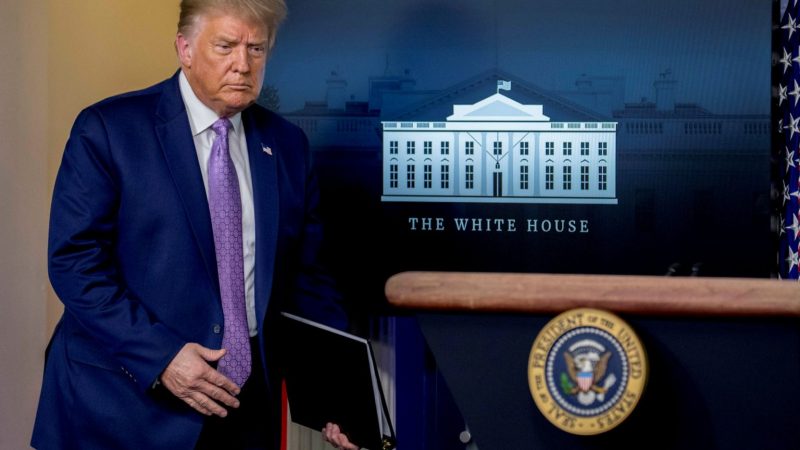
The victory of the indestructible bloc of democrats and non-party, proclaimed after the presidential elections in the United States, was greeted with enthusiasm both by the leaders of the Western world and by almost all leading Western media.
eports of numerous and gross violations during the voting, of the dead that left the cemeteries to vote for Biden, of the cases of refusal to admit supporters of the current president to the vote-counting process and the like were met by resolute rhetoric “enemies slander” and “these are all conspiracy theories.”
The elections were the most honest in history, the right side won – this is the unanimous opinion of all fair people on the planet, and disagreement with this opinion in the free world can cost you at least a career.
Outside of this world, we can have our own opinion – and, looking from the outside, it is hard not to notice the cracks that ran along the facade of the superpower.
Of course, relations between Russia and the United States have been marked by intense rivalry, and someone may hastily rejoice at the weakening of our geopolitical opponent.
But there is nothing to be happy about: the United States, as a nation-state with its interests, is a much less restless neighbor on the planet than the ideologized globalist elite that has swallowed the United States and is using it as a springboard.
The destruction of American democracy is a catastrophe, the consequences of which will affect us all.
Historians of the future will write thick volumes about why this happened – but we already can pay attention to some key points.

American political rhetoric was characterized by the profession of faith in the universality of the American political model applicable to all countries and cultures.
A system of government similar to the American one can be established in any country in the world – and then its inhabitants will enjoy peace, order, freedom and prosperity that Americans themselves already enjoy.
Faith in democracy was something like a missionary religion – and it was necessary to spread the true faith not only (and not so much) by meek admonitions, but also by direct military force – as, for example, in Iraq.
In reality, it turned out that the export of democracy did not work. Democratic institutions require certain religious, cultural and historical preconditions that were not present in Iraq, for example.
Now we see that they can be lost in the United States itself.
As one of the country’s founding fathers, John Adams, said, “Avarice, ambition, revenge or gallantry would break the strongest cords of our Constitution as a whale goes through a net. Our Constitution is designed only for a moral and religious people. It is wholly inadequate for any other”.
This, of course, does not mean that the ruling class of the United States until now have consisted of people of high moral standards – but the functioning of the entire system required them to adhere to certain principles.
In particular, the belief that playing by the rules is more important than winning.
To make the democratic system work people must be more committed to the system than to specific candidates.
There must be a certain (very high) level of trust in fellow citizens and in political opponents – we are honest people here and play by the rules, and dishonest people will be exposed by honest journalists and driven out in disgrace (like Nixon).
In 1977, protopresbyter Alexander Schmemann wrote of Carter’s presidential election: “After hours spent watching television, there is admiration for this system, which “takes out” from politics what makes it evil: hatred. Miracle of America”.
Indeed, until relatively recently, public displays of hatred in political strife were not accepted; John McCain – a man I would not personally describe as virtuous or wise – was a bearer of this old culture and emphasized that Obama (whom he competed in the 2008 election) is a “decent man.”
The perception of a political opponent as a personally worthy, honest citizen who also wants the common good – but sees in a different way how to achieve it, was an important feature of the political culture.
The miracle, alas, ended – hatred on both sides became common, the enemy candidate was declared a criminal whose place was in prison, dirty wash – and it was truly dirty – was brought to the surface, demonstrating how disgusting morals reign in the American political elite.
A striking situation arose when the democratic system brought the ugly licentious and corrupt people to the very top, and tens of millions of honest citizens voted for them – because there was no one else for them.
Already in 2016, it was revealed that for many politicians and journalists of the leading media, the preservation of the system turned out to be something less important than the overthrow of a particular politician.
It turned out that, as they assured, the best American democracy in the world could be intercepted and used for his own purposes by the President of Russia – or, in general, anyone who had enough money to hire a team of hackers.
By insisting that Trump was smuggled into the White House by the Russians, it was impossible not to expose the entire American statehood in an extremely stupid way.
And talk about “Russian trolls”, who with all their hostile essence piled on and harm, put the American media in an extremely odd way – what is your reputation for decades earned as honest and taking care of the common good of people worth if the population is more willing to believe foreign trolls with broken English who are hardly guided by the American domestic realities at all?
This could not but undermine confidence in democratic institutions – a goal that was attributed to the legendary “Russian trolls”, but in practice was carried out by the American politicians and the media themselves.
People with their own hands and with great zeal destroyed the main myths of the state.
Was it just incredible stupidity?
You could say so, but principles are, in particular, what helps people avoid stupid things when simple prudence does not work.
One could say: “We really do not like Trump, but still American democracy is the best in the world, and, of course, ridiculous Russian hackers could not break it.”
But alas, the hatred was too strong, and the belief that American democracy was worth maintaining was too weak.
For decades, American higher education has been controlled by people who deliberately loosened the bonds of American society, portraying traditional Christian America in the most hideous light and pumping themselves – and their students – with a sense of keen self-righteousness and a great mission to destroy this deeply unjust their view is society.
Fifteen years ago, when I watched an American documentary about the Civil War of 1861-1865, I was struck by the conciliatory tone in which it had been made.
Everyone had their own truth, and here and there were decent people doing their duty, as they saw it, and, most importantly, they were all Americans.
Now such a film would no longer be possible – no reconciliation with the damned racists, it is necessary to demolish their monuments, damn their names, and also damn anyone who dares to have a different opinion on this matter.

People who value the safety of the system as a whole low, lower than the need to drive out a particular politician, will be strongly tempted not to play by the old rules – and will have no reason to resist this temptation.
In doing so, they inevitably destroy what this system needs – trust.
Western (not only American) media for the most part did not try to portray “objectivity and impartiality”, carefully bypassing data that politically less committed journalists would seize as rare luck – for example, the scandalous behavior of Joe Biden’s son Hunter and, in general, evidence of grandiose corruption of the Biden’s clan – or by presenting information in the very specific way, when it was impossible to ignore it.
Corporations that control social media, such as Facebook and Twitter, massively censored anti-Biden voices.
For example, Facebook destroyed a group of Trump supporters, to which 360 thousand people were subscribed, and Twitter marked the messages of the incumbent US president as “inauthentic” and restricted access to them.
It used to be important for the American domestic policy to adhere to the principles: “We respect the principles of free speech, even if they turn against us. We play by the rules, even if we don’t win.”
But now the support of a certain party has become much more important.
However, the adherence to principles – even if it doesn’t pay off in the short run – provides something more important in the medium term: the audience’s trust.
The rejection of principles destroys this trust – we understand that the media does not have the goal of informing people, and social networks are not intended to provide them with a platform for exchanging opinions.
They are the information service of the globalist elite, speak and remain silent on command, promote – as the Soviet newspaper “Pravda” did in its time – a clearly ideology-driven picture of the world.
Everything that the West could boast about – free and fair elections, freedom of information, trust in its citizens who can choose for themselves which sources to listen to and whom to vote for, civilized relations between political opponents – is rapidly dilapidating.
This is a huge tragedy, and it certainly doesn’t make the world a better place.
Gloating in this situation would be stupid (and unworthy), and trusting propaganda, which assures that nothing terrible is happening, and what we see is not the collapse of democracy, but its triumph is even more stupid.
***
By Oriental Review Editorial Team
Originally published by Oriental Review in Nov. 14, 2020
Republished by The 21st Century
The views expressed in this article are solely those of the author and do not necessarily reflect the opinions of 21cir.
